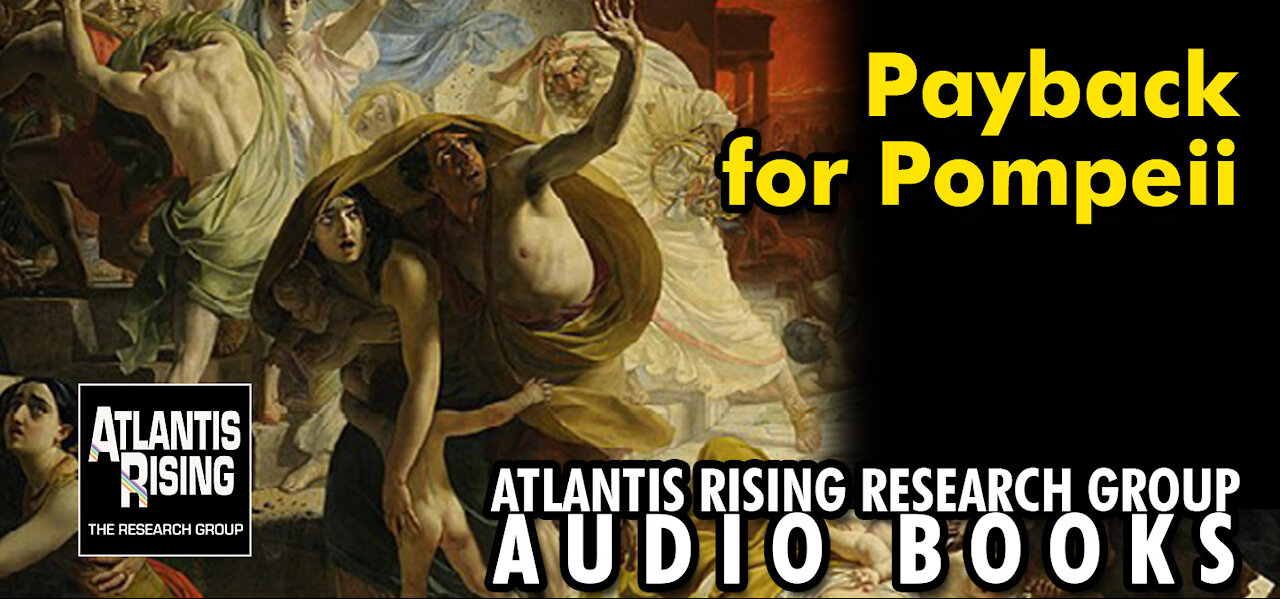Premium Only Content

Payback for Pompeii - Atlantis Rising Research Group News Blog
Visit Atlantis Rising Research Group at https://www.atlantisrising.com/
The late John Anthony West—a maverick Egyptologist himself—often complained that mainstream Egyptologists were more interested in unraveling secrets of Tutankhamun’s underwear than anything truly significant about ancient Egypt. A similar argument might be made about current archaeology for ancient Rome, especially at Pompeii and Herculaneum. In April 2020, breathless headlines proclaimed that the esteemed modern practice of recycling garbage was invented in Pompeii. Nearly forgotten in all the ‘trash talk’, was something more significant – the tragic history of a doomed city.
Utterly destroyed by the volcanic eruption of nearby Mt. Vesuvius in 79 AD, Pompeii has, nonetheless, for centuries, proved a fountain of drama. Few places do more to conjure up the image of sudden catastrophe of biblical proportions than this one, that still haunts us with the specter of twisted bodies turned to statues of volcanic ash. We can see what the end must have been like, and it was not pretty. From Sodom and Gomorrah to Plato’s Atlantis, ancient chronicles are full of cautionary tales, but ‘the last days of Pompeii’ seem especially poignant. And even though academic archaeology might be interested more in trash collection than grisly details, it would be a mistake to conclude that the terrifying lessons have been completely learned.
While visiting an art exhibition in Milan in 1833, British aristocrat Edward Bulwer-Lytton was so moved by Russian Karl Bryullov’s new painting that, within a year, he had written a novel and named after the painting. The Last Days of Pompeii was destined to become one of the best-selling novels of all time. The book, and the historical events it described, would subsequently inspire at least 15 plays, operas, and films. This past January, a documentary on the Science Channel used state-of-theart 3D technology to present a virtual tour of Pompeii just before its destruction. Bulwer-Lytton found deep meaning in the story and set out to contrast firstcentury Roman decadence and debauchery with early Christian ideals. From the city’s cataclysmic doom, he thought, came poetic retribution for its bad behavior. A member of both the British parliament and the English Rosicrucian Society, the novelist was much interested in the ‘hidden’ (i.e. ‘occult’) influence of ancient secret societies. In the Pompeii story, he saw an opportunity to bring up issues of powerful secret knowledge that he would explore more completely in later works. A common thread in both Christian and occult doctrine–often called ‘karma’–means essentially: ‘you reap what you sow.’ Pompeii, Bulwer-Lytton believed, made the point, and, he was not the last to think that he saw evidence there of consequences for human misdeeds delivered from higher levels.
Recently, a very interesting take on the idea came from a Canadian-Israeli film director, best known for the Discovery Channel documentary The Jesus Family Tomb. Simcha Jacobovici is also creator of the popular History Channel series, The Naked Archaeologist. In Secrets of Christianity, a documentary series now available on YouTube, he took on, in 2013, the implications for Christianity of the Vesuvius eruption. Jacobovici believes the disaster inadvertently elevated early Christianity to the status of a world religion by convincing paranoid Roman leaders that the Judaeo-Christian God could settle a score. Just nine years before the eruption of Vesuvius, the Roman emperor Titus had been the general in charge of putting down a Jewish revolt in Palestine. In April of 70 AD, his soldiers launched the terrifying siege of Jerusalem, culminating, four months later, in the destruction, desecration, and sacking of the Temple of Solomon. The Arch of Titus, celebrating that event, still stands in Rome. The last of the Jewish resistance fell in 73 AD at Masada.
-
 0:19
0:19
Atlantis Rising Research Group
2 years agoJoin the ATLANTIS RISING RESEARCH GROUP!
1.28K2 -
 LIVE
LIVE
The Big Mig™
3 hours agoHillary Clinton & George Soros To GITMO NOW!!!
6,883 watching -
 LIVE
LIVE
Badlands Media
7 hours agoBadlands Daily: Aug 1, 2025
4,304 watching -
 2:11:10
2:11:10
Matt Kohrs
11 hours agoTrump Tanks Stocks, Breaking Market News & Payday Friday || Live Trading
13.8K1 -
 13:42
13:42
China Uncensored
13 hours agoChina's Invasion Has Begun
7.22K18 -
 LIVE
LIVE
Wendy Bell Radio
6 hours agoBUSTED
8,003 watching -
 LIVE
LIVE
JuicyJohns
3 hours ago $0.90 earned🟢#1 REBIRTH PLAYER 10.2+ KD🟢$500 GIVEAWAY SATURDAY!
75 watching -
 4:02:39
4:02:39
The Bubba Army
1 day agoHulk Hogan had Leukemia? - Bubba the Love Sponge® Show | 8/01/25
84.4K5 -
 18:36
18:36
DeVory Darkins
10 hours ago $6.83 earnedTrump scores MAJOR WIN with Americas youth as Biden drops HORRIBLE speech
29.5K43 -
 14:13
14:13
Clickbait Wasteland
16 hours ago $5.70 earnedAsking New Yorkers Who they Support for Mayor: Harlem
49.3K37